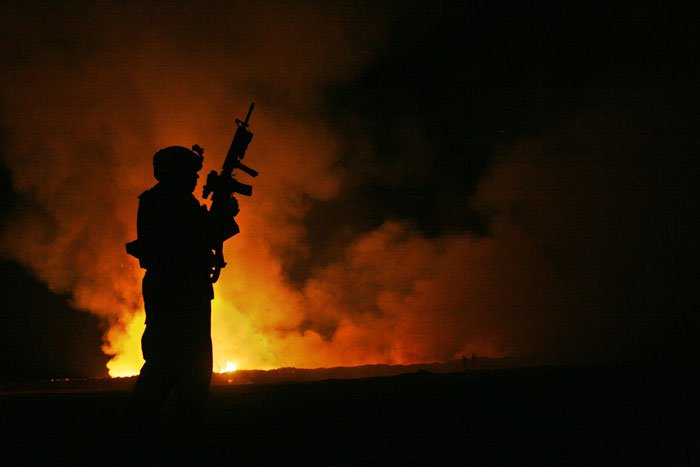PACT Act Update: VA Signs Up 280,000 New Veterans, But Some Are Still Left Out
The U.S. Department of Veteran Affairs has signed up more than 280,000 new veterans and completed roughly 900,000 new toxic exposure claims under the expansion of the PACT Act, a Biden administration move that sped up the implementation of a 2023 law aimed at securing benefits for veterans exposed to burn pits overseas.
Veterans who had exposure to some toxic substances during their military service, whether they deployed or not, became eligible for VA health coverage under the legislation as of March 5. Former service members who served as far back as the Vietnam War can have their health care costs covered for a long list of possible illnesses considered service connected, including those from exposures during domestic training or assignment.
The numbers of new veterans and completed claims were reported by VA in the April 12 edition of its PACT Act “Performance Dashboard.”

Deputy Secretary of Defense Kathleen Hicks visits the Promise to Address Comprehensive Toxics (PACT) Act and Veteran Benefits Fair at the Pentagon in March 2023. Photo by Tech. Sgt. Jack Sanders, courtesy of the U.S. Air Force.
“With this expansion, VA can care for all Veterans who served in the Vietnam War, the Gulf War, Iraq, Afghanistan, the Global War on Terror, or any other combat zone after 9/11,” Dr. Shereef Elnahal, VA’s health undersecretary, said in a statement. “We can also care for Veterans who never deployed but were exposed to toxins or hazards while training or on active duty here at home, by working with chemicals, pesticides, lead, asbestos, certain paints, nuclear weapons, x-rays, and more. We want to bring all of these Veterans to VA for the care they’ve earned and deserve.”
The exposures that are covered include, but aren’t limited to:
- Burn pits
- Sand, dust or other particulates
- Oil well or sulfur fires
- Pesticides or herbicides
- Depleted uranium with embedded shrapnel
- Contaminated water
- Asbestos
- Industrial solvents
- Lead
- Paints, including chemical agent resistant coating
- Firefighting foam
- Nuclear weapons handling, maintenance and detonation
- Radioactive material, calibration, and measurement sources
- X-rays
- Radiation from occupational exposure
- Nerve agents
- Chemical and biological weapons
Exposures are covered that took place during deployments in support of the Vietnam War, the Gulf War, or the global war on terror, but also while servicemembers were living or training on military installations known to be contaminated.
The move is part of the Sergeant First Class Heath Robinson Honoring our Promise to Address Comprehensive Toxics Act of 2022, known as the Honoring our PACT Act of 2022, or more commonly, as the PACT Act.
The PACT Act was originally designed to be rolled out over time, with new groups of veterans eligible to file for benefits every two years until 2032, so that VA would be able to work its way through a flood of claims in a timely manner.
But in January, Elnahal told reporters he was confident that VA could handle the existing workload and the new influx that would result from opening up eligibility early. While most veterans are eligible to receive basic health care through VA, whether specialty or chronic illness care is covered and how much is paid for is determined by whether the conditions being addressed are service connected, which is determined by a review of service and medical records.
This latest phase of the PACT Act eliminates any cost-sharing for a host of illnesses determined to be linked to the exposures listed above.
“And so, we’re really excited about being able to do that for our existing base and, of course, for the many new veterans who will become eligible for VA healthcare for the first time,” Elnahal said during a Feb. 26 press conference.
VA’s new philosophy on the dangers of toxic exposure is a far cry from what it was just a few years ago, when veterans groups were standing on the steps of the Capitol in Washington, demanding that a long list of cancers, respiratory illnesses and other medical conditions be recognized as service connected.
“Your average American … doesn’t have to go convince people that inhaling jet fuel is bad for your health,” Rosie Lopez-Torres, co-founder of Burn Pits 360, told The War Horse.

Sgt. Robert B. Brown from Fayetteville, N.C. with Regimental Combat Team 6, Combat Camera Unit, watches over civilian firefighters at the burn pit as smoke and flames rise into the night sky behind him in May 2007. Photo by Cpl. Samuel D. Corum, courtesy of the U.S. Marine Corps.
Presumptive illnesses include any head, neck, brain, gastrointestinal, reproductive, or respiratory cancer, and chronic bronchitis, sinusitis, or rhinitis, as well as other illnesses.
Lopez-Torres and her husband, former Army Capt. Le Roy Torres, started Burn Pits 360 as an independent registry in 2010, collecting the names of people they knew or who reached out to them after receiving a diagnosis of illnesses they believed were due to living and working near burn pits while deployed.
“It’s surreal because it started with us just saying, like, hold on, all of this is making sense,” Lopez-Torres said. “To get this acknowledged—just acknowledged, right?—is surreal.”
In addition to VA health care, the PACT Act opened up survivor benefits for veterans who had passed away from illnesses determined to be related to burn pit exposure.
Award-Winning Journalism in Your Inbox
Retired Marine Gunnery Sgt. Joseph Cancelino, at the time a New York Police Department sergeant, passed away at age 52 from metastatic testicular cancer in 2019, having barely considered that his cancer might be related to the fumes from a burn pit in Iraq during the 2003 invasion.
“I happened to mention it to my husband, probably late 2018, beginning of 2019—but at that point, he was in palliative care,” Gina Cancelino told The War Horse. “He had exhausted every avenue of treatment.”
She scoured the internet for answers, eventually linking up with Lopez-Torres, hiring a lawyer, and filing a claim as soon as the PACT Act went into effect.
“We feel that now Joe didn’t die in vain,” Cancelino said. “Even though the legislation cannot help him, hopefully it will help others and if we can help even one person his legacy will continue to live on, as his life was our kids and service to our nation and community.”

Secretary of Defense Lloyd J. Austin III records a video message with Secretary of Veterans Affairs Denis R. McDonough about the Promise to Address Comprehensive Toxics (PACT) Act at the Pentagon in June 2023.
Photo by Petty Officer 1st Class Alexander Kubitza, courtesy of the U.S. Navy.
There’s still an uphill battle for veterans who suffered toxic exposures at Karshi Khanabad Air Base in Uzbekistan, known colloquially as K2, a landing pad U.S. troops used to support operations in Afghanistan between 2001 and 2005.
“The PACT Act is an extraordinary piece of legislation that will provide generations of veterans with comprehensive care, compensation, and recognition for the illnesses and diseases caused by a variety of toxic exposures,” Mark Jackson, a former enlisted Army Criminal Investigation Division agent who deployed to the base in 2003, told The War Horse. “But there are gaps, and K2 represents the most egregious of these.”
For years, veterans who served at K2 have complained of many of the same illnesses suffered by their fellow troops who deployed to Iraq and Afghanistan because of major contamination on the former Soviet base, including depleted uranium from nuclear weapons, chemical weapon residue, fuel, and other chemicals that formed pools of “black goo” around the base.
“Whilst many of the cancers and respiratory diseases covered by the PACT Act are present in K2 veterans,” Jackson said, there are diseases and illnesses “unique to K2 veterans that are not specifically covered by legislation or by VA fiat.”
Our Journalism Depends on Your Support
Some examples are severe hypothyroidism and gastrointestinal dysfunction, which Jackson began suffering from within a year of returning from his deployment when he was 26. But he doesn’t have cancer or a chronic respiratory condition, which make up the vast majority of presumptive illnesses covered by the PACT Act.
Other K2 veterans have reported reproductive disorders, chronic joint infections, neurological disorders, autoimmune disorders, blood and bone disorders, and more medical problems that aren’t covered by the PACT Act, he said.
After testifying before Congress in 2020 about his experience, Jackson joined the Stronghold Freedom Foundation, an organization that is fighting to get all K2 veterans covered by VA.
So far, they have gotten Uzbekistan included in known burn pit exposures under the PACT Act, and filed a lawsuit to compel the Defense Department to release records related to known contamination at K2.
“It is exceedingly difficult to prove a disease or illness or death was caused by K2 when the official stance essentially boils down to ‘Well, it wasn’t so bad that we can tell,’” Jackson said.
This War Horse story was reported by Meghann Myers, edited by Erica Goode, fact-checked by Jess Rohan, and copy-edited by Mitchell Hansen-Dewar. Abbie Bennett wrote the headlines. Coverage of veterans’ health is made possible in part by a grant from the A-Mark Foundation.





Comments are closed.